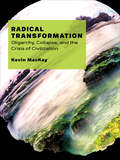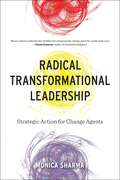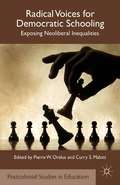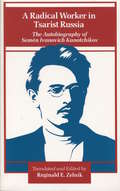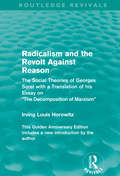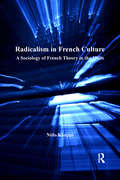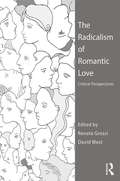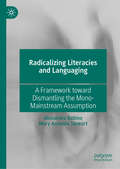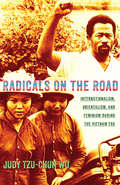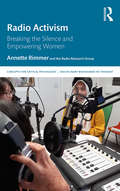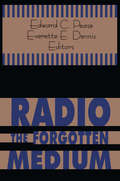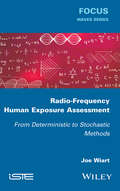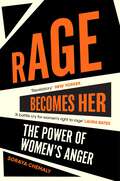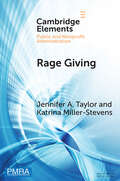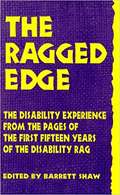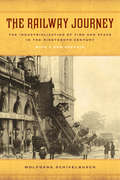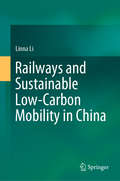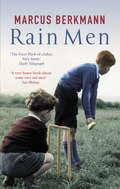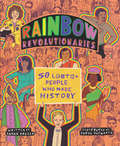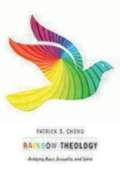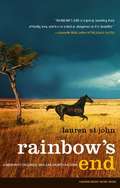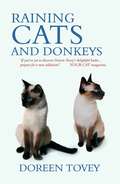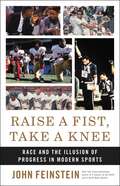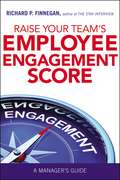- Table View
- List View
Radical Transformation: Oligarchy, Collapse, and the Crisis of Civilization
by Kevin MacKayRadical Transformation is a story about industrial civilization’s impending collapse, and about the possibilities of averting this fate. Human communities first emerged as egalitarian, democratic groups that existed in symbiotic relationship with their environments. Increasing complexity led to the emergence of oligarchy, in which societies became captive to the logic of domination, exploitation, and ecological destruction. The challenge facing us today is to build a movement that will radically transform civilization and once more align our evolutionary trajectory in the direction of democracy, equality, and ecological sustainability.
Radical Transformational Leadership: Strategic Action for Change Agents
by Monica SharmaMonica Sharma describes how we can source our inner capacities and wisdom to manifest change that embodies universal values such as dignity, compassion, fairness, and courage. Drawing on more than twenty years of work for the United Nations and elsewhere, she presents a radical new approach to transformational leadership, one that creates systems of change where everyone can engage—not just analysts and policy-makers. Demonstrating that we all can be architects of a new humanity, Monica demystifies policy-making, planning, and implementation so that everyone can play an informed and strategic part in eradicating the world’s most intractable problems. Using real-life examples from around the world, she shows how our innate characteristics of universal compassion, equity impulse, and human capability can create new patterns that effectively address major challenges such as gross inequality, unbridled hate, conflicts based on social identity, and the never-enough mindset of greed. Written in a straightforward, accessible style, Radical Transformational Leadership outlines a path-breaking paradigm shift that is already generating equitable and sustainable results across the globe.
Radical Voices for Democratic Schooling: Exposing Neoliberal Inequalities (Postcolonial Studies in Education)
by P. Orelus C. MalottComprised of in-depth interviews and conversations with key figures in education and activism that thoroughly examine the intersection of neoliberalism, neocolonialism, and racism, this first-rate collection critically explores, through their teaching, various, important issues situated in the context of Western neoliberalism and neocolonialism.
A Radical Worker In Tsarist Russia: The Autobiography Of Semen Ivanovich Kanatchikov
by Reginald E. ZelnikSemën Kanatchikov, born in a central Russian village in 1879, was one of the thousands of peasants who made the transition from traditional village life to the life of an urban factory worker in Moscow and St. Petersburg in the last years of the nineteenth century. Unlike the others, however, he recorded his personal and political experiences (up to the even of the 1905 Revolution) in an autobiography. First published in the Soviet Union in the 1920s, this memoir gives us the richest and most thoughtful firsthand account we have of life among the urban lower classes in Imperial Russia. We follow this shy but determined peasant youth's painful metamorphosis into a self-educated, skilled patternmaker, his politicization in the factories and workers' circles of Moscow and St. Petersburg, and his close but troubled relations with members of the liberal and radical intelligentsia. Kanatchikov was an exceptionally sensitive and honest observer, and we learn much from his memoirs about the day-to-day life of villagers and urban workers, including such personal matters as religious beliefs, family tensions, and male-female relationships. We also learn about conditions in the Russian prisons, exile life in the Russian Far North, and the Bolshevik-Menshevik split as seen from the workers' point of view.
Radicalism and the Revolt Against Reason: The Social Theories of Georges Sorel with a Translation of his Essay on the Decomposition of Marxism (Routledge Revivals)
by Irving Louis HorowitzRadicalism and the Revolt Against Reason is a work that continues to have a steady and large scale impact on political and social theory fifty years since its first appearance. A study of how radical thought modifies its actions and ideologies in a time of unrealized and frustrated expectations, the focus is on Georges Sorel and the Europe of the fin de siècle, a time when socialist revolution was forcefully set aside by liberal reform. In a technique that presaged contemporary period, radical demands did not simply dissolve or disappear, they profoundly changed emphasis from the impersonal forces of history to highly personal forces of individual will. This edition includes a substantial brand new introduction by the author.
Radicalism in French Culture: A Sociology of French Theory in the 1960s (Public Intellectuals and the Sociology of Knowledge)
by Niilo KauppiAn invisible pattern draws together most studies dealing with French cultural radicalism in the 1960s with intellectual creation reduced to individual creation and the role of semiotic and social factors that influence intellectual innovation minimized. Sociological approaches often see a more or less external link between social location and intellectual production but, because of their structural approach, they are incapable of taking into account unique historical circumstances, the crucial role of personal impulses, and more importantly the semiotic logic of ideas as conditions of innovative thinking. This ground-breaking book will further an internal sociological analysis of ideas and styles of thought. It will show that the defining but largely neglected feature of what has become "French theory" was a collective mind and style of thought, an explosive but fragile mixture of scientific and political radicalism that rather quickly watered down to academic orthodoxy. For some time, radical intellectuals succeeded in producing ideas that were perfectly in tune with the demands of the consumers, mostly the young university audience. Ideas were used as part of radical posture that was set in opposition to the establishment and "those in power". Ideas could not be too empirical or verifiable, and they had to shock. It is not surprising that a slew of new sciences and concepts were invented to indicate this radical posture. The central argument of this study is that ideas become "power-ideas" only if they succeed in uniting individual and collective psychic investment in powerful social networks with significant institutional and political backing. These conditions were met in the French context for a certain specific period of time. From roughly the mid-1960s to the beginning of the 1970s, radical intellectuals such as Roland Barthes, Pierre Bourdieu, Jacques Derrida, Michel Foucault, Julia Kristeva developed a host of new ideas, concepts and theories, a number of which have subsequently been labelled as French theory.
The Radicalism of Romantic Love: Critical Perspectives
by Renata Grossi David WestUndoubtedly Romantic love has come to saturate our culture and is often considered to be a, or even the, major existential goal of our lives, capable of providing us with both our sense of worth and way of being in the world. The Radicalism of Romantic Love interrogates the purported radicalism of Romantic love from philosophical, cultural and psychoanalytic perspectives, exploring whether it is a subversive force capable of breaking down entrenched social, political and cultural norms and structures, or whether, in spite of its role in the fight against certain barriers, it is in fact a highly conservative impulse. Exploring both the grounds for the central place of Romantic love in contemporary lives and the meaning, extent and nature of its supposed radicalism, this volume considers love from a variety of theoretical perspectives, with attention to matters of gender, sexuality, class and ethnicity. With authors examining a range of questions, including the role of love in the same-sex marriage debate, polyamory and the notion of love as a political force, The Radicalism of Romantic Love illuminates a fundamental but perplexing aspect of our contemporary lives and will appeal to scholars across the social sciences and humanities with interests in the emotions and love as a social and political phenomenon.
Radicalizing Literacies and Languaging: A Framework toward Dismantling the Mono-Mainstream Assumption
by Alexandra Babino Mary Amanda StewartThis book names and confounds the mono-mainstream assumption that invisibly frames much research, the ideologies that normalize monolingualism, monoculturalism, monoliteracy, mononationalism, and/or monomodal ways of knowing. In its place, the authors propose multi- and trans- lenses of these phenomena steeped in a raciolinguistic perspective on Bourdieu’s reflexive sociology to move toward a more accurate, multidimensional view of racialized peoples’ literacy and language practices. To achieve this, they first engage in a comprehensive review of literacies, languaging, and a critical sociocultural framework. Then, the distinct testimonios of four women underscore this framework in practice, followed by action steps for research, policy, and pedagogy. This book will be of particular interest to literacy and language education researchers.
Radicals On The Road: Internationalism, Orientalism, and Feminism during the Vietnam Era (The United States in the World)
by Judy Tzu-Chun WuTraveling to Hanoi during the U. S. war in Vietnam was a long and dangerous undertaking. Even though a neutral commission operated the flights, the possibility of being shot down by bombers in the air and antiaircraft guns on the ground was very real. American travelers recalled landing in blackout conditions, without lights even for the runway, and upon their arrival seeking refuge immediately in bomb shelters. Despite these dangers, they felt compelled to journey to a land at war with their own country, believing that these efforts could change the political imaginaries of other members of the American citizenry and even alter U. S. policies in Southeast Asia. In Radicals on the Road, Judy Tzu-Chun Wu tells the story of international journeys made by significant yet underrecognized historical figures such as African American leaders Robert Browne, Eldridge Cleaver, and Elaine Brown; Asian American radicals Alex Hing and Pat Sumi; Chicana activist Betita Martinez; as well as women's peace and liberation advocates Cora Weiss and Charlotte Bunch. These men and women of varying ages, races, sexual identities, class backgrounds, and religious faiths held diverse political views. Nevertheless, they all believed that the U. S. war in Vietnam was immoral and unjustified. In times of military conflict, heightened nationalism is the norm. Powerful institutions, like the government and the media, work together to promote a culture of hyperpatriotism. Some Americans, though, questioned their expected obligations and instead imagined themselves as "internationalists," as members of communities that transcended national boundaries. Their Asian political collaborators, who included Buddhist monk Thich Nhat Hanh, Foreign Minister of the Provisional Revolutionary Government Nguyen Thi Binh and the Vietnam Women's Union, cultivated relationships with U. S. travelers. These partners from the East and the West worked together to foster what Wu describes as a politically radical orientalist sensibility. By focusing on the travels of individuals who saw themselves as part of an international community of antiwar activists, Wu analyzes how actual interactions among people from several nations inspired transnational identities and multiracial coalitions and challenged the political commitments and personal relationships of individual activists.
Radio Activism: Breaking the Silence and Empowering Women (Concepts for Critical Psychology)
by Annette RimmerThis unique book draws on the narratives of women participants in community radio, using intersectionality, feminist, critical psychological and community development frameworks to explore how this highly symbolic, creative dimension of activism can unmute marginalised women and enrich corporate media. Over a period of four years, twelve female radio project volunteers offer their experiences which they analyse, together as part of the RRG (Radio Research Group), alongside a conceptual and contextual framework to produce insights on the gendered nature of silence, voice and empowerment, and the wider potential of radio activism. Employing literature from a variety of fields, from bell hooks to Stuart Hall, the book foregrounds evidence from the majority world to argue the empowerment potential of community radio and the barriers to radio participation. Through this analysis community radio emerges as a site of development, from which diverse identities transpire through laughter, dialogue, raised consciousness and solidarity, but it also exposes the conflicts of empowerment by recognising inherent tensions in womanhood and in communities. Centering on the global, hegemonic challenge of empowering women, and relevant across multiple disciplines and professions, this is fascinating reading for academics, students and professionals in psychology, gender studies, media studies, development and related areas.
Radio - The Forgotten Medium
by Edward C. Pease Everette E. DennisAlthough television is now dominant, radio surprisingly remains a medium of unparalleled power and importance. Worldwide, it continues to be the communications vehicle with the greatest outreach and impact. Every indicator - economic, demographic, social, and democratic - suggests that far from fading away, radio is returning to our consciousness, and back into the cultural mainstream.Marilyn J. Matelski reviews radio's glory days, arguing that the glory is not all in the past. B. Eric Rhoads continues Matelski's thoughts by explaining how and why radio has kept its vitality. The political history of radio is reviewed by Michael X. Delli Carpini, while David Bartlett shows how one of radio's prime functions has been to serve the public in time of disaster. Other contributors discuss radio as a cultural expression; the global airwaves; and the economic, regulatory, social, and technological structures of radio.Collectively, the contributors provide an intriguing study into the rich history of radio, and its impact on many areas of society. It provides a wealth of information for historians, sociologists, and communications and media scholars. Above all, it helps explain how media intersect, change focus, but still manage to survive and grow in a commercial environment.
Radio-Frequency Human Exposure Assessment
by Joe WiartNowadays approximately 6 billion people use a mobile phone and they now take a central position within our daily lives. The 1990s saw a tremendous increase in the use of wireless systems and the democratization of this means of communication. To allow the communication of millions of phones, computers and, more recently, tablets to be connected, millions of access points and base station antennas have been extensively deployed. Small cells and the Internet of Things with the billions of connected objects will reinforce this trend. This growing use of wireless communications has been accompanied by a perception of risk to the public from exposure to radio frequency (RF) electromagnetic field (EMF). To address this concern, biomedical research has been conducted. It has also been important to develop and improve dosimetry methods and protocols that could be used to evaluate EMF exposure and check compliance with health limits. To achieve this, much effort has was made in the 1990s and 2000s. Experimental and numerical methods, including statistical methods, have been developed. This book provides an overview and description of the basic and advanced methods that have been developed for human RF exposure assessment. It covers experimental, numerical, deterministic and stochastic methods.
Rage Becomes Her: The Power Of Women's Anger
by Soraya ChemalyA conversation-shifting book urging 21st-century women to understand their anger, embrace its power, and use it as a tool for positive change 'How many women cry when angry because we've held it in for so long? How many discover that anger turned inward is depression? Soraya Chemaly's Rage Becomes Her will be good for women. After all, women have a lot to be angry about.' GLORIA STEINEM Women are angry, and it isn't hard to figure out why. We are underpaid, overworked, thwarted and diminished. The assertive among us are labelled bitches, while the expressive among us are considered shrill. We are told to stand down when we have an opinion and to calm down when we are fired up. And when we somehow manage to put one high heel-battered foot in front of the other despite all of this, we're asked if it would kill us to smile. We are mad as hell, and that's completely okay. Because contrary to the endless barrage of self-help rhetoric about anger management and letting go, the reality is that our rage is the most important resource we have as women, a force for creation rather than destruction, our sharpest tool against both personal and political oppression. Anger is not what gets in our way, it is our way. All we need to do is own it. This is a pitch perfect, engaging, and accessible credo written by one of today’s most influential feminists. Analysing female anger as it relates to topics like self-worth, objectification, pain, care, fear, silence, and denial, Soraya illuminates how and why we repress our anger, revealing the harm that this causes, and helping us recognise the liberating power of owning our anger and marshalling it as a vital tool for positive change. Just as Quiet brought about a new embrace of introversion, Rage Becomes Her will bring about an embrace of feminine anger that will leave women feeling liberated, inspired and connected to an entire universe of women who are no longer interested in making nice.
Rage Giving (Elements in Public and Nonprofit Administration)
by Jennifer A. Taylor Katrina Miller-StevensAfter the 2016 election upheaval and polarized public discourse in the United States and the rise of radical-right and populist parties across the globe, a new phenomenon in online charitable giving has emerged – donating motivated by rage. This Element defines this phenomenon, discusses its meaning amidst the current body of research and knowledge on emotions and charitable giving, the implications of viral fundraising and increased social media use by both donors and nonprofit organizations, the intersectionality of rage giving and its meaning for practitioners and nonprofit organizations, the understanding of giving as a form of civic engagement, and the exploration of philanthropy as a tool for social movements and social change. Previous research shows contextual variation in charitable giving motivations; however, giving motivated by feelings of anger and rage is an unstudied behavioral shift in online giving.
The Ragged Edge: The Disability Experience from the Pages of the First Fifteen Years of The Disability Rag
by Barrett ShawWhen it began publication in the late 1970s The Disability Rag was at the cutting edge of the disability movement. This book gathers essays and poetry from the Rag's first fifteen years. The voices are angry and honest, speaking of rights violated and dreams deferred, and always holding out the hope of a better future. These essays are written with the philosophy that each of us, no matter how severely disabled, deserves to be treated with respect and to live a life of dignity and opportunity.
The Railway Journey
by Wolfgang SchivelbuschThe impact of constant technological change upon our perception of the world is so pervasive as to have become a commonplace of modern society. But this was not always the case; as Wolfgang Schivelbusch points out in this fascinating study, our adaptation to technological change--the development of our modern, industrialized consciousness--was very much a learned behavior. In The Railway Journey, Schivelbusch examines the origins of this industrialized consciousness by exploring the reaction in the nineteenth century to the first dramatic avatar of technological change, the railroad. In a highly original and engaging fashion, Schivelbusch discusses the ways in which our perceptions of distance, time, autonomy, speed, and risk were altered by railway travel. As a history of the surprising ways in which technology and culture interact, this book covers a wide range of topics, including the changing perception of landscapes, the death of conversation while traveling, the problematic nature of the railway compartment, the space of glass architecture, the pathology of the railway journey, industrial fatigue and the history of shock, and the railroad and the city. Belonging to a distinguished European tradition of critical sociology best exemplified by the work of Georg Simmel and Walter Benjamin, The Railway Journey is anchored in rich empirical data and full of striking insights about railway travel, the industrial revolution, and technological change. Now updated with a new preface, The Railway Journey is an invaluable resource for readers interested in nineteenth-century culture and technology and the prehistory of modern media and digitalization.
Railways and Sustainable Low-Carbon Mobility in China
by Linna LiThis book explores the role of railways in developing sustainable low-carbon mobility by analyzing the intermodal relationship between railways and other transport modes. Focusing on geographical and governance perspectives, and taking China as a case study, it analyzes the competition and cooperation between and integration of railways and other transport modes, in order to provide guidance on future sustainable transport development. Firstly, the book examines the contribution of railways to low carbon emissions in China over recent decades by estimating the carbon dioxide emissions from various transport modes in China at national and regional levels using decomposition analysis. It then discusses the current competition and cooperation between railways and other transport modes, as well as their integration and the impact of their relationship on climate change. It also highlights how the competition between railways and other transport modes may change the passenger flows between city pairs and so alter transport carbon emissions and examines how cooperation and integration could improve passengers’ travel experience while at the same time reducing carbon emissions. Lastly, it addresses the implications for future sustainable transport development based on institutional analysis. Presenting multidisciplinary, sustainable transport research on the role of railways in reducing carbon emissions, and also offering policy recommendations for developing low-carbon, integrated transport in the future, this book is a valuable reference resource for graduates, researchers, and government managers responsible for transport development, urban planning and environmental policy.
Rain Men
by Marcus BerkmannThere are many cricket books, and they are all the same. 'Don't Tell Goochie', autobiographical insights of nights on the tiles in Delhi with Lambie and the boys; 'Fruit cake days', a celebrated humourist recalls 'ball' - related banter of yore; and Wisden, a deadly weapon when combined with a thermos flask. Rain Men is different. Like the moment the genius of Richie Benaud first revealed itself to you, it is a cricketing epiphany, a landmark in the literature of the game.Shining the light meter of reason into cricket's incomparable madness, Marcus Berkmann illuminates all the obsessions and disappointments that the dedicated fan and pathologically hopeful clubman suffers year after year - the ritual humiliation of England's middle order, the partially-sighted umpires, the battling average that reads more like a shoe size. As satisfying as a perfectly timed cover drive, and rather easier to come by, Rain Men offers essential justification for anyone who has ever run a team-mate out on purpose or secretly blubbed at a video of Botham's Ashes.
Rain Men
by Marcus BerkmannThere are many cricket books, and they are all the same. 'Don't Tell Goochie', autobiographical insights of nights on the tiles in Delhi with Lambie and the boys; 'Fruit cake days', a celebrated humourist recalls 'ball' - related banter of yore; and Wisden, a deadly weapon when combined with a thermos flask. Rain Men is different. Like the moment the genius of Richie Benaud first revealed itself to you, it is a cricketing epiphany, a landmark in the literature of the game.Shining the light meter of reason into cricket's incomparable madness, Marcus Berkmann illuminates all the obsessions and disappointments that the dedicated fan and pathologically hopeful clubman suffers year after year - the ritual humiliation of England's middle order, the partially-sighted umpires, the battling average that reads more like a shoe size. As satisfying as a perfectly timed cover drive, and rather easier to come by, Rain Men offers essential justification for anyone who has ever run a team-mate out on purpose or secretly blubbed at a video of Botham's Ashes.
Rainbow Revolutionaries: Fifty LGBTQ+ People Who Made History
by Sarah Prager*A Junior Library Guild Selection* This groundbreaking, pop-culture-infused LGBTQ+ illustrated biography collection takes readers on an eye-opening journey through the lives of fifty influential queer figures who have made a mark on every century of human existence. Rainbow Revolutionaries brings to life the vibrant histories of fifty pioneering LGBTQ+ people from around the world. Through Sarah Prager’s (Queer, There, and Everywhere) short, engaging bios, and Sarah Papworth’s bold, dynamic art, readers can delve into the lives of Wen of Han, a Chinese emperor who loved his boyfriend as much as his people, Martine Rothblatt, a trans woman who’s helping engineer the robots of tomorrow, and so many more! This book is a celebration of the many ways these heroes have made a difference and will inspire young readers to make a difference, too. Featuring an introduction, map, timeline, and glossary, this must-have biography collection is the perfect read during Pride month and all year round. Biographies include: Adam Rippon, Alan L. Hart, Alan Turing, Albert Cashier, Alberto Santos-Dumont, Alexander the Great, Al-Hakam II, Alvin Ailey, Bayard Rustin, Benjamin Banneker, Billie Jean King, Chevalière d'Éon, Christina of Sweden, Christine Jorgensen, Cleve Jones, Ellen DeGeneres, Francisco Manicongo, Frida Kahlo, Frieda Belinfante, Georgina Beyer, Gilbert Baker, Glenn Burke, Greta Garbo, Harvey Milk, James Baldwin, Jóhanna Sigurðardóttir, José Sarria, Josephine Baker, Juana Inés de la Cruz, Julie d'Aubigny, Lili Elbe, Ma Rainey, Magnus Hirschfeld, Manvendra Singh Gohil, Marsha P. Johnson, Martine Rothblatt, Maryam Khatoon Molkara, Natalie Clifford Barney, Navtej Johar, Nzinga, Pauli Murray, Renée Richards, Rudolf Nureyev, Sally Ride, Simon Nkoli, Stormé DeLarverie, Sylvia Rivera, Tshepo Ricki Kgositau, Wen of Han, We’wha
Rainbow Theology: Bridging Race, Sexuality, And Spirit
by Patrick S. Cheng* The first book to explore the theologies of lesbian, gay, bisexual, and transgender (LGBT) people of color * Addresses issues of homophobia in communities of color, including ethnic churches, as well as racism in LGBT communities * Pioneering work on the global and local intersections of race, sexuality, and religion To date, no book has systematically examined the theological writings of LGBT people of color. Nor has any book explored how such writings might actually transform contemporary theological reflections on race and sexuality. This book remedies these gaps by constructing a rainbow theology around the theme of bridging or mediation. Rainbow Theology is the first book to reflect upon the theological significance of the intersections of race and queer sexuality across multiple ethnic and cultural groups. This is particularly important in light of the current polarizing debates over issues of race, sexuality, and religion within churches and communities of faith around the world.
Rainbow's End: A Memoir of Childhood, War and an African Farm
by Lauren St. JohnIn 1978, in the final, bloodiest phase of the Rhodesian civil war, eleven-year-old Lauren St. John moves with her family to Rainbow's End, a wild, beautiful farm and game reserve set on the banks of a slow flowing river.
Raining Cats and Donkeys
by Doreen ToveyLife is never a bed of roses for the Toveys and their beloved Siamese cats Solomon and Sheba. For one thing they've got Annabel the donkey to contend with! Filled with amusing anecdotes, 'Raining Cats and Donkeys' recalls the adventures and misadventures of the family and their adorable animals.
Raise a Fist, Take a Knee: Race and the Illusion of Progress in Modern Sports
by John FeinsteinBased on dozens of shocking interviews with some of the most influential names in sports, this is the urgent and revelatory examination of racial inequality in professional athletics America has been waiting for.Commentators, coaches, and fans alike have long touted the diverse rosters of leagues like the NFL and MLB as sterling examples of a post-racial America. Yet decades after Tommie Smith and John Carlos raised their fists in a display of Black power and pride, and years after Colin Kaepernick shocked the world by kneeling for the national anthem, the role Black athletes and coaches are expected to perform—both on and off the field—still can be determined as much by stereotype and old-fashion ideology as ability and performance.Whether it&’s the pre-game moments of resistance, the lack of diversity among coaching and managerial staff, or the consistent undervaluation of Black quarterbacks, racial politics impact every aspect of every sport being played—yet the gigantic salaries and glitzy lifestyles of pro athletes often disguise the ugly truths of how minority players are treated and discarded by their White bosses. John Feinstein crisscrossed the country to secure personal interviews with quarterbacks, coaches, and more, revealing the stories none of us have heard (but all of us should know).Seventy-five years after Jackie Robinson broke baseball's color line, race is still a central and defining factor of America's professional sports leagues. With an encyclopedic knowledge of professional sports, and shrewd cultural criticism, bestselling and award-winning author John Feinstein uncovers not just why, but how, pro sports continue to perpetuate racial inequality. &“None of us are trying to make race an issue. Race IS an issue.&” (From the Foreword by Doug Williams)
Raise Your Team's Employee Engagement Score: A Manager's Guide
by Richard P. FinneganWant employees that go the extra mile?Love them or hate them, employee engagement surveys are here to stay. As manager, you’re expected to digest the data and come up with a plan for improving the numbers. But it’s not just busy work. Raising engagement scores matters because engagement matters. An enthusiastic workforce translates into higher productivity and profitability with less turnover and absenteeism. Fully committed workers will give their all every day — and it’s your job to make that happen.Forget company picnics or employee-of-the-month awards. For real results, read Raise Your Team’s Employee Engagement Score. In this practical, research-based playbook, retention expert Richard Finnegan reveals how to:Build trust with your teamImplement stay interviewsDevelop an employee value propositionLeverage company engagement programsHire employees who self-motivateApply smarter, better metricsMeasure progress and forecast future engagementAnd moreBy following Finnegan’s techniques, you’ll send those engagement scores through the roof . . . and it won’t cost your company a dime.
